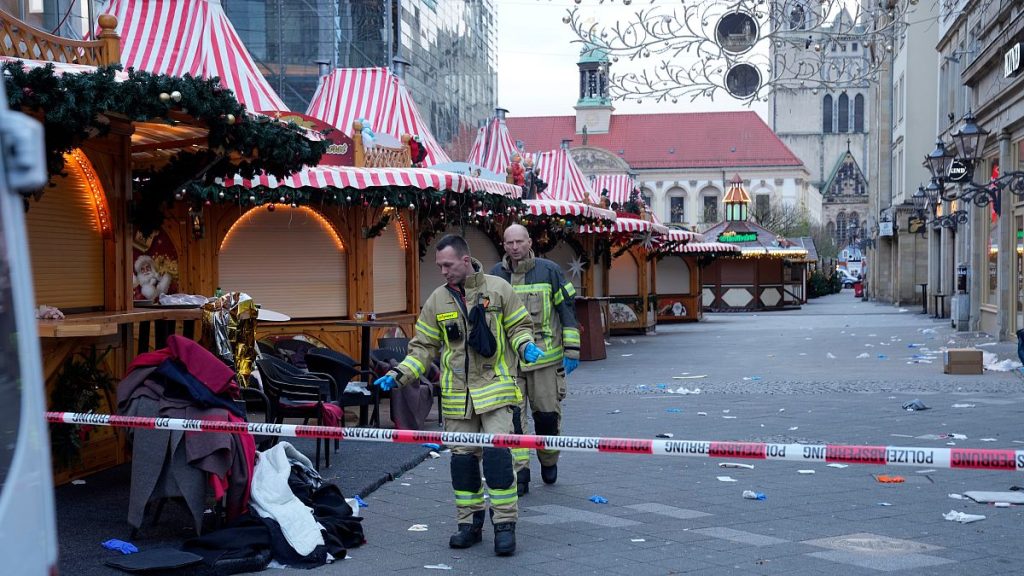The peaceful atmosphere of a Christmas market in Magdeburg, Germany, was shattered on Friday evening when a car deliberately drove into a crowd of revelers, leaving a trail of devastation and heartbreak in its wake. The festive scene of twinkling lights and holiday cheer transformed into a chaotic nightmare as the vehicle plowed through the market, striking unsuspecting individuals and families who had gathered to celebrate the season. The immediate aftermath was marked by scenes of panic and confusion as bystanders rushed to aid the injured and emergency services struggled to navigate the congested area. The incident has left two people confirmed dead, one adult and one toddler, and at least 68 injured, some critically, casting a long shadow over the holiday season and raising concerns about the increasing vulnerability of public spaces.
The attack, which authorities are characterizing as deliberate, has shaken the nation and prompted a wave of condemnation and expressions of grief from political leaders and citizens alike. German Chancellor Olaf Scholz and Federal Interior Minister Nancy Faeser are scheduled to visit Magdeburg on Saturday to assess the situation firsthand and meet with local officials, demonstrating the seriousness with which the government is treating the tragedy. Faeser has announced that federal police are actively involved in supporting the local police investigation, underscoring the national significance of the incident and the commitment to bringing those responsible to justice. The investigation will undoubtedly focus on determining the motive behind the attack, examining the driver’s background, any potential accomplices, and the possibility of extremist links. Authorities will also review security measures in place at the market and explore potential improvements to prevent similar incidents in the future.
The Magdeburg Christmas market attack resonates with disturbing echoes of similar incidents in recent years, highlighting the growing concern surrounding vehicle attacks as a method of terrorism and violence. The chilling use of a vehicle as a weapon to inflict mass casualties has become a tragically recurring tactic, raising questions about the efficacy of current security measures and the need for increased vigilance in public spaces. The tragedy in Magdeburg serves as a stark reminder of the vulnerability of crowded public gatherings and the potential for seemingly joyous occasions to be transformed into scenes of horror in an instant. It also underscores the continuing challenge of balancing the need for public safety with the desire to maintain open and accessible communities.
The attack has not only inflicted physical injuries but has also left deep emotional scars on the community and the nation. The loss of innocent lives, particularly the tragic death of a young child, has amplified the sense of grief and outrage. The incident has shaken the sense of security and trust within the community and left many questioning the safety of public spaces. The emotional impact extends far beyond Magdeburg, resonating across Germany and internationally, as people grapple with the senseless violence and the vulnerability of shared spaces that are meant to bring joy and community. The long-term psychological consequences for survivors, witnesses, and first responders will undoubtedly be significant, requiring ongoing support and resources to address the trauma they have experienced.
The investigation into the Magdeburg Christmas market attack is ongoing, with authorities working diligently to gather evidence, analyze the circumstances leading up to the tragedy, and determine the motives behind the perpetrator’s actions. As details emerge, the focus will likely shift towards understanding the individual’s background, potential radicalization, and any connections to extremist ideologies or groups. The investigation will also examine the security measures in place at the market and explore any potential vulnerabilities that may have contributed to the incident. Furthermore, the investigation will undoubtedly scrutinize the driver’s access to the vehicle, their driving history, and any previous interactions with law enforcement. The findings of the investigation will be crucial in informing future security strategies and preventative measures to mitigate the risk of similar attacks in the future.
The Magdeburg Christmas market attack represents a stark reminder of the fragility of peace and security and the ongoing threat of violence in our communities. While the immediate focus is on supporting the victims, their families, and the affected community, the incident also compels a broader societal reflection on the underlying factors that contribute to such acts of violence and the measures needed to prevent them. This tragedy necessitates a concerted effort to strengthen community resilience, promote tolerance and understanding, and foster a culture of peace. Ultimately, the path forward requires a collective commitment to addressing the root causes of violence, investing in mental health support, and creating safer and more inclusive communities for all. The memory of the victims and the lessons learned from this tragedy should serve as a catalyst for positive change and a renewed determination to build a world free from violence and hatred.










